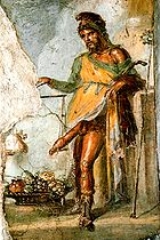
Priapus
Overview
- For the ancient city in Asia Minor, see KarabigaKarabigaKarabiga is a town in Biga District, Çanakkale Province, in the Marmara region of Turkey. It is located at the mouth of the Biga River, on a small east-facing bay. Its ancient name was Priapus....
.
In Greek mythology
Greek mythology
Greek mythology is the body of myths and legends belonging to the ancient Greeks, concerning their gods and heroes, the nature of the world, and the origins and significance of their own cult and ritual practices. They were a part of religion in ancient Greece...
, Priapus or Priapos , was a minor rustic fertility god, protector of livestock
Livestock
Livestock refers to one or more domesticated animals raised in an agricultural setting to produce commodities such as food, fiber and labor. The term "livestock" as used in this article does not include poultry or farmed fish; however the inclusion of these, especially poultry, within the meaning...
, fruit plants, gardens and male genitalia. Priapus is marked by his absurdly oversized, permanent erection
Erection
Penile erection is a physiological phenomenon where the penis becomes enlarged and firm. Penile erection is the result of a complex interaction of psychological, neural, vascular and endocrine factors, and is usually, though not exclusively, associated with sexual arousal...
, which gave rise to the medical term priapism
Priapism
Priapism is a potentially harmful and painful medical condition in which the erect penis or clitoris does not return to its flaccid state, despite the absence of both physical and psychological stimulation, within four hours. There are two types of priapism: low-flow and high-flow. Low-flow...
. He became a popular figure in Roman erotic art
Erotic art in Pompeii and Herculaneum
Erotic art in Pompeii and Herculaneum was discovered in the ancient cities around the bay of Naples after extensive excavations began in the 18th century. The city was found to be full of erotic art and frescoes, symbols, and inscriptions regarded by its excavators as pornographic. Even many...
and Latin literature
Latin literature
Latin literature includes the essays, histories, poems, plays, and other writings of the ancient Romans. In many ways, it seems to be a continuation of Greek literature, using many of the same forms...
, and is the subject of the often humorously obscene collection of verse called the Priapeia
Priapeia
The Priapeia is a collection of ninety-five poems in various meters on subjects pertaining to the phallic god Priapus. It was compiled from literary works and inscriptions on images of the god by an unknown editor, who composed the introductory epigram. From their style and versification it is...
.
Priapus was described as the son of Aphrodite
Aphrodite
Aphrodite is the Greek goddess of love, beauty, pleasure, and procreation.Her Roman equivalent is the goddess .Historically, her cult in Greece was imported from, or influenced by, the cult of Astarte in Phoenicia....
by Dionysus
Dionysus
Dionysus was the god of the grape harvest, winemaking and wine, of ritual madness and ecstasy in Greek mythology. His name in Linear B tablets shows he was worshipped from c. 1500—1100 BC by Mycenean Greeks: other traces of Dionysian-type cult have been found in ancient Minoan Crete...
, or son of Dioysus and Chione
Chione
Chione , or Khione may refer to:-In Greek mythology:*Chione , mother of Eumolpus by Poseidon...
, perhaps as father or son of Hermes
Hermes
Hermes is the great messenger of the gods in Greek mythology and a guide to the Underworld. Hermes was born on Mount Kyllini in Arcadia. An Olympian god, he is also the patron of boundaries and of the travelers who cross them, of shepherds and cowherds, of the cunning of thieves, of orators and...
, son of Zeus
Zeus
In the ancient Greek religion, Zeus was the "Father of Gods and men" who ruled the Olympians of Mount Olympus as a father ruled the family. He was the god of sky and thunder in Greek mythology. His Roman counterpart is Jupiter and his Etruscan counterpart is Tinia.Zeus was the child of Cronus...
or Pan
Pan (mythology)
Pan , in Greek religion and mythology, is the god of the wild, shepherds and flocks, nature, of mountain wilds, hunting and rustic music, as well as the companion of the nymphs. His name originates within the Greek language, from the word paein , meaning "to pasture." He has the hindquarters, legs,...
, depending on the source.

